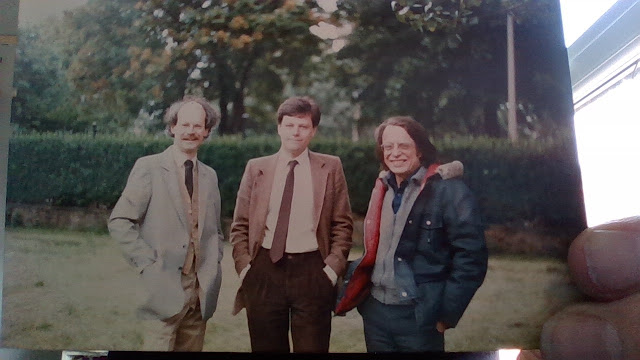Here’s a hubpost to all of those I’m posting now on my Selected Poems of Mary Robinson: Pages: Selecting for a Selected: The Poems of Mary Robinson 1 (robertsheppard.blogspot.com)
The Selected Poems of Mary Robinson is now out from Shearsman – edited by me!
Publisher’s details HERE: Mary Robinson - Selected Poems (shearsman.com)
The publisher's sample of the book may be read here: mary-robinson-selected-poems-sampler.pdf (cdn-website.com)
*
About a month ago I paid a visit to the Slavery Museum in Liverpool, as I explain in my email below. I thought I’d post it online, since it outlines ways in which Mary Robinson is travestied, even now. The contemporary scandal and the Victorian revulsion at it never quite rubbed off this remarkable woman. And I thought I’d post it today because it is Slavery Remembrance Day. Here’s what’s on today at the Museum : Slavery Remembrance Day 2023 | National Museums Liverpool (liverpoolmuseums.org.uk) And here’s what’s happening in London: Slavery Remembrance Day 2023 | National Maritime Museum (rmg.co.uk) .I haven’t received a reply to my email (yet). They probably think I’m a nutter. (They must get hate mail: a racist group protested outside the Museum last week, with a nice big banner saying ‘White Lives Matter’.) In some schools in the US the 'benefits' of slavery are being taught.
Dear Sir or Madam
(Please forward this email to a curator, please.)
I very much enjoyed my visit to the Slavery Museum yesterday afternoon, distantly some research for a poem I’m writing about blues music. [This is called 'Searching the Desert for the Blues', and I am currently revising it; there's a passage below.] I am also editing the poems of Mary Robinson, and so was interested in your feature on her Liverpool lover, Banastre Tarleton, an enthusiastic pro-slaver, right up to his death on the eve of abolition.
I’m glad he’s there, and I’m glad the feature reports his war career (today he would be classed as a war criminal). However, I was dismayed to see the unsubstantiated claim that he seduced Mary Robinson as a bet, and also that it referred to her by her nickname ‘Perdita’ (the part she played in a version of The Winter’s Tale which attracted the attention of the Prince of Wales, which led to their affair). Never have I seen the locution ‘Perdita Robinson’ (not even in the Gilray cartoons of the time). In fact, Mary was an abolitionist (later she was friends with William Godwin and other radicals). She also wrote about slavery in her poem ‘The Negro Girl’ and in her long political protest poem ‘The Progress of Liberty’. I intend to include both texts in my volume of her poems, and I attach my life of Robinson, [ that's also available here: Pages: Selecting for a Selected: The Poems of Mary Robinson 2: The Life of Mary Robinson (robertsheppard.blogspot.com)] and the texts for your perusal. If such information was added to the display, the complexities, ironies and contradictions of the pro- and anti- slavery positions would be more apparent. In your account, Mary appears as a pawn in Tarleton’s roguery, but in fact their relationship was long-lasting, and Mary was just as able to seduce him.
Yours faithfully
Robert
Sheppard
Emeritus
Professor of Poetry and Poetics
Edge Hill University
Here's an excerpt from 'The Progress of Liberty':
Shall
the poor AFRICAN, the passive slave,
Born
in the bland effulgence of broad day,
Cherish’d
by torrid splendours, while around
The
plains prolific teem with honey’d stores
Of
Afric’s burning soil; shall such a wretch
Sink
prematurely to a grave obscure,
No
tear to grace his ashes? Or suspire,
To
wear submission’s long and goading chain,
To
drink the tear, that down his swarthy cheek
Flows
fast, to moisten his toil-fever’d lip,
Parch’d
by the noontide blaze? Shall he endure
The
frequent lash, the agonizing scourge,
The
day of labour, and the night of pain;
Expose
his naked limbs to burning gales;
Faint
in the sun, and wither in the storm;
Traverse
hot sands, imbibe the morbid breeze,
Wing’d
with contagion, while his blister’d feet,
Scorch’d
by the vertical and raging beam,
Pour
the swift life-stream? Shall his frenzied eyes,
Oh!
worst of mortal miseries! Behold
The
darling of his soul, his sable love,
Selected
from the trembling, timid throng
By
the wan tyrant, whose licentious touch
Seals
the dark fiat of the slave’s despair!
And here's a fragment of what I wrote after visiting the museum, from my poem about the blues:
…localities on maps, familiar names
on a manifest, a portrait or two in postures of Attic tranquility, pro-saccarites on porcelain sugar bowls, sketches of woolybacks unloading
Confederate bales, proclaim the guilty-elect of this city, no step now without
a blue note to trip us…
Locating Robert Sheppard: email: robertsheppard39@gmail.com website: www.robertsheppard.weebly.com Follow on
Twitter: Robert Sheppard (@microbius) / Twitter latest blogpost: www.robertsheppard.blogspot.com





